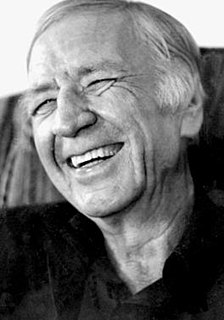Цитата Армистеда Мопена
Я всегда не доверял мемуарам. Я склонен писать свои мемуары через мою художественную литературу. Докопаться до истины легче, не утверждая, что вы ее говорите. Некоторые вещи можно сказать в художественной литературе, чего никогда нельзя сказать в мемуарах.
Связанные цитаты
Переход от мемуаров к фантастике был фантастическим. Я боялся отойти от мемуаров; Я написал несколько набросков романов, но в то время они не были хорошо приняты моим агентом, и мне внушили, что «мемуары продаются лучше, чем художественная литература два к одному» (не уверен, что это правда сейчас и будет ли это когда-либо было), поэтому я чувствовал, что единственный разумный поступок в профессиональном плане — продолжать копаться в своей жизни в поисках болезненных моментов, которые можно было бы резюмировать.
Прекрасные мемуары относятся к прекрасному роману, как хорошо сшитое одеяло к причудливо вышитому лоскутному одеялу. Мемуары, логическое творение, анализируют и возвышают действительность. Художественная литература, совершенно экстравагантная, возвеличивает его и придает ему нравственную форму. Художественная литература не имеет практической цели. Художественная литература, в конце концов, это искусство.
Во всем, что вы помните, есть элемент вымысла. Воображение и память — это почти одни и те же мозговые процессы. Когда я пишу художественную литературу, я знаю, что использую кучу лжи, которую придумал, чтобы создать некую форму правды. Когда я пишу мемуары, я использую настоящие элементы, чтобы создать что-то, что всегда будет каким-то образом выдумано.
Есть так много историй, которые нужно рассказать, а они не рассказываются. Мы склонны раскладывать вещи по полочкам: «Это мемуары о мусульманине» или «Это мемуары о женщине или обычном человеке». Есть некая история, которая претендует на универсальность. Все остальное - этническая фантастика. Любой может стремиться к универсальности.
Я тебе пишу мемуары, но это всплывает даже в художественной литературе. Люди просто предполагают, что вы пишете слегка завуалированную автобиографию. И особенно, я думаю, для цветных людей наша работа всегда воспринимается как своего рода антропологический артефакт, несмотря ни на что. Таким образом, всегда будет такое предположение, но тем более в мемуарах, потому что часто даже имена не меняются. Проверить проще.
Я не верю, что художественная литература мертва. Я знаю, что есть люди, которые считают, что это устаревший вид искусства, и что для выражения правды сегодня нужно работать в разных формах, писать книги, где, может быть, непонятно, что вымысел, а что мемуары. Я ничего не имею против этих книг и многие из них очень люблю. Но места хватит всем, и традиционным реалистам, и писателям-гибридам, и писателям-экспериментаторам.
Художественная литература в лучшем случае культивирует фантазию и сострадание; в худшем случае мемуары провоцируют злорадство и похотливость. Боюсь, ужасная правда заключается в том, что многих людей привлекают сенсационные мемуары по той же причине, по которой они смотрят «Ученика»: им нравится наблюдать настоящие страдания, унижение прямо у вас на глазах.
Папа всегда говорил, что у него достаточно проблем, чтобы отделить вымысел от так называемых фактов, не читая художественную литературу. Он всегда говорил, что наука уже слишком запутана, не пытаясь совместить ее с религией. Он говорил эти вещи, но он также говорил, что наука сама по себе может быть религией, что широкий ум всегда рискует стать узким.




































